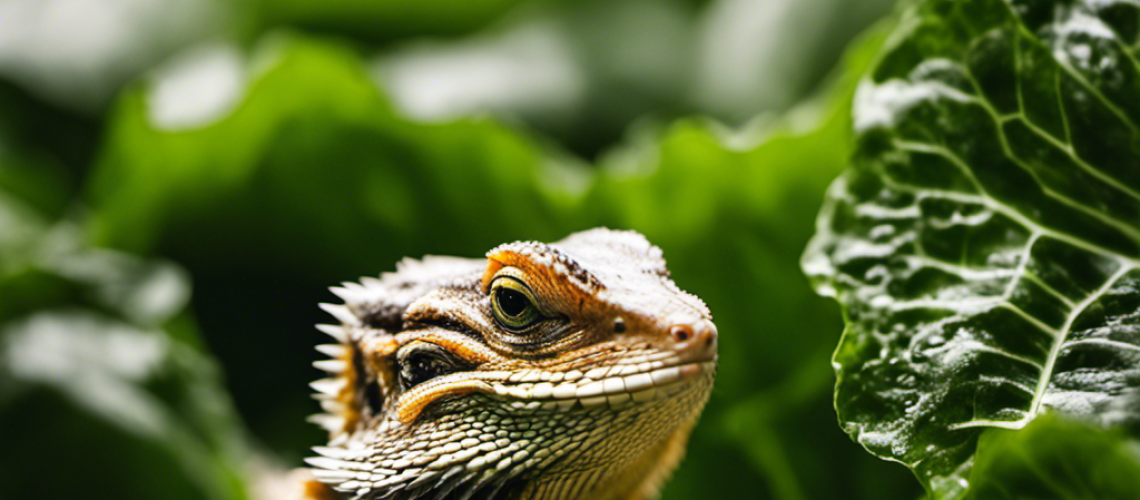Bearded dragons are a popular pet reptile, and proper nutrition is essential for their health.
Collard greens can be part of a bearded dragon’s diet, but it is important to understand the potential risks associated with including them in their diet.
This article will explore why collard greens are nutritious for bearded dragons, how to prepare them, potential risks of feeding these greens to bearded dragons, additional foods that should be included in their diet, and why variety is key.
Key Takeaways
- Collard greens are a nutritious food for bearded dragons, rich in essential vitamins and minerals.
- They provide an alternative source of calcium and phosphorous, important for the reptile’s health.
- However, overfeeding or an unbalanced diet of collard greens can lead to toxicity symptoms and digestive issues.
- It is important to provide a balanced diet with variety, including other leafy greens, vegetables, insects, and fruits, to avoid nutritional deficiencies and promote optimal health.
Why Collard Greens Are Nutritious for Bearded Dragons
Collard greens are a nutritious vegetable for bearded dragons, providing an array of essential vitamins and minerals. They can be used as an alternative source of calcium and phosphorous when fed in appropriate portion sizes.
Rich in dietary fiber, collard greens also contain vitamins A, C, K, as well as folate and iron. Additionally, they boast a healthy dose of omega-3 fatty acids which help support the immune system.
When fed in moderation to beardies, collard greens offer numerous health benefits that should not be overlooked.
How to Prepare Collard Greens for Bearded Dragons
Preparing collard greens for consumption by reptiles may require specific considerations. When choosing a suitable variety, consider the size of mature plants and their ability to thrive in your climate; look for freshness and color.
Planting tips include:
1) Select a sunny spot with well-draining soil.
2) Test pH levels regularly and amend when necessary.
3) Water deeply and consistently.
With proper planning, you can provide your reptile with a nutritious source of collard greens.
Potential Risks of Feeding Collard Greens to Bearded Dragons
Consumption of collard greens by reptiles may carry certain risks. Overfeeding can lead to signs of toxicity such as decreased appetite, lethargy, and vomiting. Additionally, an unbalanced diet consisting mostly of vegetables can lead to malnutrition or other digestive issues.
To avoid these dangers, it is important to provide a balanced diet with variety and feed only in moderation. Careful monitoring for signs of distress should also be observed when providing bearded dragons with collard greens.
Additional Foods to Include in a Bearded Dragon Diet
In addition to collard greens, a variety of other foods may be included in the diet of a bearded dragon. These include:
- A wide selection of leafy greens and vegetables, like turnip greens, mustard greens, dandelion greens, endive lettuce, sweet potato, green beans
- Insects such as crickets and mealworms
- Fruits in moderation.
All must be fed with caution to ensure gut health and calcium balance.
Variety in a Bearded Dragon Diet
Variety in diet is essential for bearded dragons, as a monotonous diet can lead to nutritional deficiencies. Incorporating a variety of insects, veggies, and supplements into their feeding schedules ensures they receive the vitamins and minerals they need.
Temperature requirements must also be taken into consideration when providing food to ensure it’s still nutritious and safe to eat. Vitamin supplementation should be considered for optimal health.
A diverse selection of foods helps ensure bearded dragons have the freedom to enjoy life with all its varied flavors and textures.
Frequently Asked Questions
How Often Should Bearded Dragons Eat Collard Greens?
Bearded dragons can benefit from the nutritional content of collard greens, when fed in moderation. Recommended feeding frequency for this vegetable is one to two times a week. This allows bearded dragons to reap the nutrition benefits while avoiding potential digestive issues caused by overfeeding.
Are Collard Greens a Necessary Part of a Bearded Dragon’s Diet?
Collard greens are not necessary for a bearded dragon’s diet, but can be beneficial if fed in moderation. The feeding frequency and nutrition benefits should be considered when deciding whether to include collard greens as part of their diet.
Are There Any Other Vegetables Similar to Collard Greens That Bearded Dragons Can Eat?
Bearded dragons can benefit from a well-rounded diet that includes vegetables like kale, turnip greens, mustard greens, and Swiss chard. A variety of nutrient-rich foods help promote dietary balance and optimal health. Feeding techniques should be tailored to the individual’s needs for a balanced diet.
Is It Safe for Young Bearded Dragons to Eat Collard Greens?
Storing collards at a proper temperature is key to safely offering them to young bearded dragons. Nutrient levels in the collards should be taken into account before feeding them, as they can contain calcium oxalate crystals that may not be suitable for younger dragons. Offering collard greens is an excellent way to provide nutrition and variety for young bearded dragons.
Are There Any Special Techniques for Feeding Collard Greens to Bearded Dragons?
Feeding collard greens to bearded dragons requires special techniques such as portion size control. Measurement of appropriate amounts is essential to ensure the dragon gets sufficient nutrition without overeating. Proper feeding technique can help keep your bearded dragon healthy.
Conclusion
Bearded dragons can benefit from the addition of collard greens to their diet. When prepared properly, this leafy green vegetable provides a source of vitamins and minerals and helps ensure bearded dragons receive a balanced diet.
While there may be some risks associated with feeding collard greens to bearded dragons, these can be avoided by exercising caution when preparing them or supplementing with other nutritious foods.
Ultimately, it is important that bearded dragon owners provide variety in their pet’s diet for optimal health.






